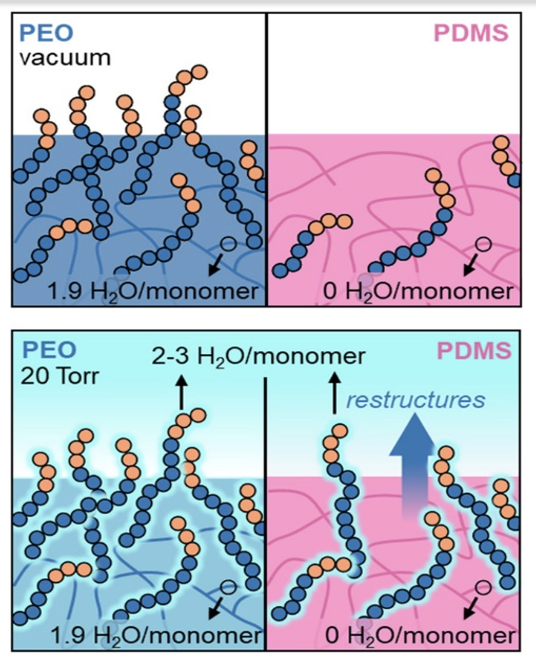
Scientific Achievement
In situ ambient pressure X-ray photoelectron spectroscopy (APXPS) reveals that polypeptoid-modifications can alter polymer interactions with water and instigate surface restructuring.
Image: Polypeptoid surface presentation and effects on water affinity for PEO- and PDMS-based copolymers. Polypeptoids are drawn to the surface under vacuum by their fluorinated monomers (orange) in PEO, while their hydrophilic backbone and ether monomers (blue) instigate restructuring under hydrated conditions in PDMS.
Significance and Impact
This study demonstrates the importance of in situ measurements by highlighting the crucial role that both the polymer backbone and environmental conditions have on surface presentation and water affinity.
Research Details
Poly(ethylene oxide) (PEO)- and poly(dimethylsiloxane) (PDMS)-based polymer surfaces were modified with amphiphilic polypeptoid side chains. APXPS was used to understand the surface composition and water adsorption of the polypeptoid-modified block copolymers under conditions ranging from ultrahigh vacuum through 100% relative humidity.
Notes
Strategies for tuning polymeric water filtration membranes to target specific contaminates or reduce fouling include surface modification with functional groups. In order to understand how to most effectively functionalize membranes, in situ surface characterization methods are needed. In this work, we use ambient pressure X-ray photoelectron spectroscopy (APXPS) to demonstrate that surfaces modified with amphiphilic polymers are capable of restructuring and altering the overall water affinity under ambient conditions. This finding is important because it shows the importance of in situ measurements when designing membrane surfaces.
Acknowledgements
The authors gratefully acknowledge financial support by the Office of Naval Research (ONR) from Awards N00014-17-1-2047 and N00014-13-1-0633 for material synthesis and structural characterization. P.A.G. and E.J.C. were fully and partially, respectively, supported for the development of APXPS for these polymeric systems by the Center for Materials for Water and Energy Systems (M-WET), an Energy Frontier Research Center funded by the U.S. Department of Energy (DOE), Office of Science, Basic Energy Sciences (BES), under Award #DE-SC0019272. E.J.C. was partially supported by an Early Career Award in the Condensed Phase and Interfacial Molecular Science Program in the Chemical Sciences Geosciences and Biosciences Division of the Office of Basic Energy Sciences of the DOE under contract DE-AC02–05CH11231. M.E.B. gratefully acknowledges the National Science Foundation for a graduate fellowship under Award #DGE 1650114, while A.J.D. acknowledges support from the National Defense Science and Engineering Graduate Fellowship Program. This research used resources of the Advanced Light Source and the Molecular Foundry, which are DOE Office of Science User Facilities supported by the Office of Science, Office of Basic Energy Sciences, of the U.S. Department of Energy, under Contract DE-AC02–05CH11231.
Related Publication
Mikayla E. Barry, Pinar Aydogan Gokturk, Audra J. DeStefano, Amanda K. Leonardi, Christopher K. Ober, Ethan J. Crumlin, and Rachel A. Segalman, "Effects of Amphiphilic Polypeptoid Side Chains on Polymer Surface Chemistry and Hydrophilicity", ACS Appl. Mater. Interfaces, 14(5), 7340-7349, 2022 January 28, https://doi.org/10.1021/acsami.1c22683.

